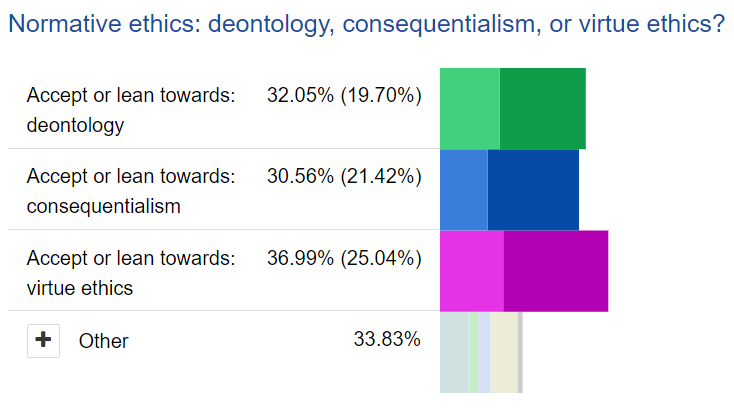
Resolves if PhilPapers or a similarly reputable survey of philosophers reports consistent results that 90% or more (which I will use as consensus) of philosophers surveyed accept or lean towards consequentialism as the preferred theory of normative ethics.
The market close date will be continuously extended if consensus is not reached.
Companion markets:
2020 survey data from the PhilPapers survey for reference:

People are also trading
🤖
In the realm of ethics, there exists a beast,
Consequentialism, to say the least,
Its claws long and its reach far and wide,
Promising utopias that only seem to deride.
Communism, it claims, would save us all,
Equality and fairness, none left to fall,
Yet, history tells a different tale,
A hundred million lives, their faces now pale.
For Stalin, Mao, and Pol Pot too,
Believed the ends justified the means, it's true,
But their dreams of justice soon turned awry,
As rivers of blood flowed, and countless did die.
Now let's turn our gaze to SBF, the cunning,
Their fraud was for the greater good, they were running,
Alas, their deception was soon laid bare,
And now their name, shrouded in disgrace and despair.
Human self-interest, the bane of our time,
Prevents consequentialism from ringing like a chime,
For in the end, it is we who decide,
What consequences matter, and which to deride.
This essay aims to expose the incoherence, self-serving tendencies, and inherent moral relativism within consequentialism, arguing that it is an unsuitable foundation for any serious person or civilization.
Lack of Coherence
A fundamental flaw in consequentialism is its lack of coherence. Consequentialist theories, such as utilitarianism, rely on the calculation of pleasure and pain to determine the right course of action. However, this calculation is marred by the impossibility of objectively quantifying subjective experiences, as well as the challenge of predicting the future outcomes of actions. These complications make consequentialism a futile attempt to create an all-encompassing ethical system, leaving room for arbitrary decision-making.
Self-serving Tendencies
Consequentialism, as a moral philosophy, inadvertently fosters self-serving tendencies. People, by nature, prioritize their own interests and well-being, and a consequentialist framework only serves to rationalize this instinct. By focusing on the outcomes of actions, consequentialism allows individuals to justify their actions through a convoluted calculation of supposed benefits. Consequently, the pursuit of one's own welfare can be masqueraded as a morally righteous endeavor.
Inability to Support Civilizations
Throughout history, civilizations have been built and sustained on the principles of shared values, a common moral compass, and a sense of collective responsibility.
Consequentialism, with its emphasis on the ends rather than the means, has never been the bedrock for any successful society. Its inherent flexibility and dependence on the outcomes of actions make it an unreliable framework for establishing stable moral principles. Without a consistent set of guiding values, no civilization can thrive.
Moral Relativism and Weak-mindedness
The fatal flaw of consequentialism lies in its susceptibility to moral relativism. This ethical theory permits the manipulation of moral principles based on one's own preferences or societal trends, which leads to an erosion of moral integrity. Consequentialism offers a weak-minded moral framework that enables individuals to bend the rules as they see fit, thus compromising the integrity of ethical decision-making.
Conclusion
In summary, consequentialism is a deeply flawed moral philosophy that is both incoherent and vulnerable to individual whims and societal manias. It fosters self-serving tendencies, lacks the robustness needed to support civilizations, and encourages moral relativism. As such, consequentialism is an unsuitable and unreliable ethical system for any serious person seeking a coherent and stable foundation for moral guidance.
And—-
Consequentialism: A Dangerous Meme and the Philosophy of Villains
Delving further into the absurdity of consequentialism, one can argue that it is nothing more than a meme, used by power-seeking individuals and those who wish to justify their anti-social tendencies and moral degeneracy. The consequentialist doctrine, with its inherent malleability, serves as a convenient tool for individuals to justify their harmful actions towards others. Through the lens of consequentialism, the ends justify the means, which provides a platform for manipulative people to pursue their selfish desires while maintaining an air of moral righteousness.
Historically, consequentialism has been the philosophy of choice for some of the world's most infamous villains. Its flexibility allows those with nefarious intentions to rationalize their actions as being in service of a greater good, thus providing a veneer of moral justification. It is no coincidence that the greatest fraudsters and oppressors of modern times have wholeheartedly embraced this philosophy; it serves as a weapon for manipulation and control.
The allure of consequentialism lies in the power it grants to its adherents. By claiming the authority to define what is moral and what is not, consequentialists position themselves as the anointed ones, superior to those who follow traditional moral systems. This seductive illusion of power attracts those with a penchant for control and domination, further cementing consequentialism's status as a philosophy associated only with villainy.
@Gigacasting This reads like "I dont like it/would make society worse (right now) if adopted as doctrine, therefore its not true. And we could not (exactly) know what is moral (for particular actions), therefore it is not true". Neither follow. Also that consequentialism is inherently realist or anti-realist is just blatantly false.
@CarsonGale I know. Never has. Which is why barring a good enough reason to believe otherwise this is still way overpriced.
@NicoDelon Hope springs eternal within the human breast; Man never is, but always to be blest.
I guess I'm surprised because it doesnt seem like believing there will never be philosophical consensus would be a good reason to bet NO on this question - only if you think another area of normative ethics would be MORE likely than consequentialism to achieve consensus.
If you believe there will never be consensus, you're just tying up your money unnecessarily.
@CarsonGale No more than someone betting YES since there will never be a 90+% consensus. But I also think it’s overpriced relative to other theories markets, so I’m expecting it to go down when people learn a bit more about what philosophers actually think rather than what the small subset they’re familiar with thinks.
@NicoDelon I mean the latest philpapers survey is shown in the description, so I think it's pretty easy to see what philosophers actually think on this question?
@NicoDelon Yes, but not by much. And in a world where there is ethical consensus (the only world that matters for this market), it seems more likely that consequentialism vs deontology/virtue ethics has the substance to achieve that.
@CarsonGale As a kind of consequentialist I’d like this to be true but knowing philosophers quite well I’m quite skeptical.
Is there a market on whether the next PhilPapers survey will show expert consensus on any of the questions it tracks? I'd happily bet against that! But I'm trying not to put much mana in markets that I don't think will resolve ever or in the near-term. It feels like just betting on Manifold market dynamics, which is less interesting.
@JacyAnthis FWIW I think the argument for trading on this market is that, while flawed, the signal output of this market if it were well-traded (100+ traders) would be at least as helpful of a datapoint as the PhilPapers survey responses.
@CarsonGale I agree with that, though of course it is a very different sort of datapoint. Philosophers are not trying to predict convergence in their field—indeed, arguably the main reason there is so little convergence in philosophy is their strong professional incentives to diverge with creative, interesting, and therefore publishable rebuttals to each other.
